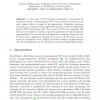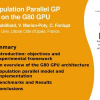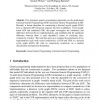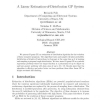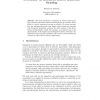107
click to vote
EUROGP
2008
Springer
15 years 3 months ago
2008
Springer
A new class of FPGA-based accelerators is presented for Cartesian Genetic Programming (CGP). The accelerators contain a genetic engine which is reused in all applications. Candidat...
121
click to vote
EUROGP
2008
Springer
15 years 3 months ago
2008
Springer
Abstract. Virtual creatures operating in a physically realistic 3D environment, as originally introduced by Karl Sims, provide a challenging domain for artificial evolution. Howeve...
125
click to vote
EUROGP
2008
Springer
15 years 3 months ago
2008
Springer
Abstract. Turing machines are playing an increasingly significant role in Computer Science domains such as bioinformatics. Instead of directly formulating a solution to a problem, ...
93
Voted
EUROGP
2008
Springer
15 years 3 months ago
2008
Springer
97
Voted
EUROGP
2008
Springer
15 years 3 months ago
2008
Springer
140
click to vote
EUROGP
2008
Springer
15 years 3 months ago
2008
Springer
Two prominent genetic programming approaches are the graph-based Cartesian Genetic Programming (CGP) and Linear Genetic Programming (LGP). Recently, a formal algorithm for construc...
109
Voted
EUROGP
2008
Springer
15 years 3 months ago
2008
Springer
We present N-gram GP, an estimation of distribution algorithm for the evolution of linear computer programs. The algorithm learns and samples the joint probability distribution of...
EUROGP
2008
Springer
15 years 3 months ago
2008
Springer
EUROGP
2008
Springer
15 years 3 months ago
2008
Springer
Abstract. This work postulates a mechanism by which random genotypic variation is directed towards favourable phenotypic variation. Evolvability is a poorly understood concept at p...
